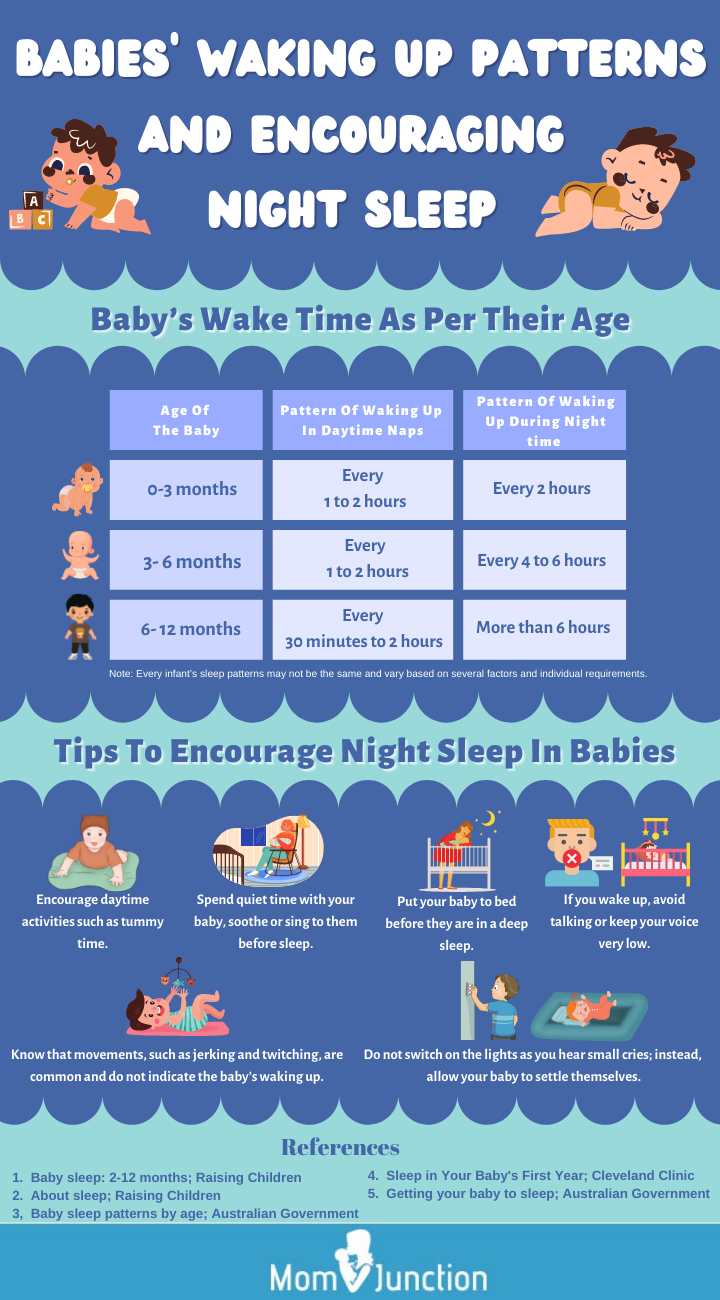

The little sleep you get is a luxury after attending to the baby’s needs most of the day and night. But sometimes, the baby may wake up soon, costing you this rest time. This may often leave you wondering, “Why does my baby wake up too early?”
In that case, this is the post you need. Scroll down as we have listed the reasons and a few solutions to tackle this problem. However, before jumping to the solutions, it is important to understand if the baby is waking up early.
How To Determine If Your Baby Is Waking Up Early?
Some babies are early risers, while others wake up between 7 and 8 AM. So, it is important to understand whether your baby is waking up too early or during their normal wake-up time.
Babies’ sleep needs change as they grow; for example, infants of six months of age need 13–14 hours of sleep (1). So, let’s assume you put your six-month-old baby to bed at 8 PM, and they wake up at 6 AM or before that daily. In such a case, you might ask, “Is my baby waking up too early?” There are three possible answers to this.
- It cannot be considered waking up too early if your baby takes three to four hours of daytime nap and have a good night’s sleep.
- If your baby wakes up at 6 AM every day and is active throughout the day, they might be an early riser, and you need not worry about their sleep schedules.
- If your baby wakes up before 6 AM, refuses to go back to sleep, and is cranky or fussy throughout the day, then your baby might be waking up too early.
Read the next section to understand the possible reasons why your baby wakes up early.
Why Do Some Babies Wake Up Too Early?
There could be many reasons why a baby wakes up early. Here are some possible reasons, ranging from serious to normal.
1. Medical conditions
Certain medical conditions may cause sleep disturbances in babies and wake them up early in the morning. Babies with gastroesophageal reflux (GER) are restless throughout the night and wake up often (2). Sleep apnea is also associated with disturbed sleep in babies. Look for the signs and symptoms of GER and sleep apnea to rule out such underlying medical conditions that might cause your baby to wake up early, and properly manage such to minimize the night time discomfort of your baby.
2. Growth spurts
Sleep regressions
and growth spurts also disturb your baby’s sleep schedules. Babies tend to go through growth spurts from the first two weeks to six months of age. So, if your baby wakes up relatively early during this time, they might be going through a growth spurt. Usually, babies get back to their regular sleep schedules once the growth spurt period passes.
3. Hunger
Babies’ feeding patterns also change as they grow. During the early stages (under nine months), babies tend to wake up frequently for feedings due to the small size of their tummies. They might also feel hungrier if they are going through a growth spurt.
4. Surroundings
Light plays a key role in regulating the wake and sleep patterns in babies. Melatonin is a hormone that regulates sleep–wake cycles. Recent studies have found that the percentage of melatonin suppression due to light exposure is two times greater in children than in adults (3). So, if your baby is exposed to sunlight early in the morning, it affects their circadian rhythm and makes them wake up early.
5. Poor self-soothing skills
Some babies are natural self-soothers; they tend to go back to sleep independently even if they wake up early in the morning. However, others need parental intervention, such as cuddling, rocking, or feeding to fall back to sleep. If your baby wakes up early, it could be due to their poor self-soothing skills.
6. Overtiredness
It is important to get your baby to sleep when they show early sleep cues because if you miss that sleep window, the baby will get overtired. Babies who are overtired are more difficult to put to sleep and often wake up during the night.
If your baby wakes up early and is happy and content, do not worry as you are on the right track, and your baby is just an early riser. But if your baby wakes up too early and is cranky or tired during the night, you need to take a few steps to help them have an adequate sleep.
What To Do If Your Baby Is Waking Up Too Early?
Sleep is essential during the early stages of life as it plays an important role in cognitive development and physical growth (2). So, if your baby, for some reason, is waking up too early and is not getting enough sleep, you need to intervene. Here are a few useful tips for doing it.
The first step is to track your baby’s sleep schedule to understand if they are getting enough sleep. If your baby appears fussy all day and is not getting the required sleep, it is important to find ways to help them sleep better.
1. Maintain consistency
Create a night routine and try to stick to it. Make sure to put your baby to bed by 7–7:30 PM. Consistency is key here; you need to put the baby to sleep at the same time each night so that their body gets used to the timing. You may not see the results immediately, but have patience and keep on trying.
2. Treat the underlying medical conditions
If you suspect GERD or sleep apnea in your baby, talk to your pediatrician to get it diagnosed and treated. Once the underlying cause is treated, your baby will be able to sleep peacefully again.
3. Sleep-train them
Babies who self-soothe themselves usually fall back to sleep even if they wake up too early. If your baby is not a self-soother, sleep-train them to go back to sleep without intervention. You can try either the cry-it-out or the no-cry sleep training methods.
4. Keep the nursery dark
Another simple way to prevent your baby from waking up too early is to limit light exposure. Your baby’s body is highly sensitive to sunlight, which could signal them to wake up before their wake-up time. So, invest in some quality drapes or sunshades to prevent sunlight from entering the room in the morning.
5. Maintain a bedtime routine
Plan a bedtime routine and do a few activities one to two hours before bedtime. Include relaxing activities, such as bathing your baby and reading them a bedtime story. These will help your baby relax, make them ready for sleep, and reduce the chances of them waking up too early.
6. Maintain a calm environment
As the sun rises, the world wakes up, and there would be cars honking, dogs barking, or other members in the house getting ready for the day. If your baby is a light sleeper, they might wake up to all these sounds. Take care to keep the windows of their room closed, or use a white noise machine to block the external sounds.
7. Dream feed them
If your baby wakes up too early due to hunger, try dream feeding them. It is a breastfeeding technique in which the baby is fed while they are half asleep. Track your baby’s feeding timings and give them one more feed after the last feed of the day. This might help them sleep longer as their tummy would be full. Ensure you feed them as quietly as possible and do not wake them.
8. Do not play with them
It could be tempting to play with your little one or show them cartoons when they wake up early in the morning. But, refrain from doing so; treat early morning wakings much like the late-night feeds, keeping them as quiet as possible. This will encourage your baby to go back to sleep.
9. Make daytime naps short
Your baby needs to take short naps during the day so that they sleep well at night or not wake up early in the morning. This does not mean you restrict daytime naps because, if you do so, it will make your baby overtired and wake up too early.
10. Give them something to hold on to
If your baby associates sleep with a soft toy or pacifier, giving it to them when they wake up early in the morning might help them fall back to sleep. However, make sure your baby is 12 months old before you introduce any foreign object into their bed.
Frequently Asked Questions
1. Should I shift my baby’s bedtime if the baby wakes up too early?
Yes, gradually shifting your baby’s bedtime and creating a more peaceful environment may change your baby’s schedule of waking up too early. However, establishing this routine may take a few nights (4) (5).
2. How do I know if my baby wakes up from hunger?
Many times, babies wake up hungry and start crying. If you do not respond to them immediately, this cry may turn into a wail. In most cases, it is not easy to soothe a hungry child unless you feed them. With observation, you may start understanding how your babies’ cries vary according to their needs (6).
Most parents avoid waking up their babies too early to get some rest. A baby waking up too early might lead to sleep deprivation for the parents and the baby. Therefore, you need to intervene at the earliest and promote healthy sleeping habits. Though you may not succeed instantly, keep investing your efforts so your baby will learn to be habituated to your schedule. Soon, you can find your little one sleeping on time and letting you have the rest you deserve at night.
Infographic: Baby’s Waking Up Cycle And Tips To Facilitate Night Sleep
A baby’s sleep pattern transforms considerably over the first year. Some babies may have longer naps, while others tend to wake early, with most needing support to go back to sleep at night. Learn about the typical waking patterns in babies and how to aid your baby sleep for longer by reading through this infographic. Illustration: Momjunction Design Team
Key Pointers
- First, check if your baby is a natural early riser or they wake up before completing their sleep cycle.
- The latter could be due to gastrointestinal reflux, sleep apnea, hunger, or external disturbances.
- Identify the underlying cause and discuss with your pediatrician to treat them accordingly.
- Maintaining a proper bedtime routine, creating a calm sleeping environment, and reducing daytime naps may help.
References
1. Elaine KH Tham, Nora Schneider, and Birit FP Broekman; Infant sleep and its relation with cognition and growth: a narrative review; Nature and Science of Sleep (2017).
2. Gastroesophageal Reflux; Helping Your Baby;; Seattle Children’s
3. Sang-il Lee, et al.; Melatonin suppression and sleepiness in children exposed to blue-enriched white LED lighting at night; Physiological Reports (2018).
4. Sleep and Your 1- to 3-Month-Old; Nemours KidsHealth
5. Sleep in Your Baby’s First Year; Cleveland Clinic
6. Responding To Your Baby’s Cries; Healthychildren.org; AAP
Community Experiences
Join the conversation and become a part of our nurturing community! Share your stories, experiences, and insights to connect with fellow parents.
Read full bio of Maria Carmela Villania-Mamauag
Read full bio of Rohit Garoo















